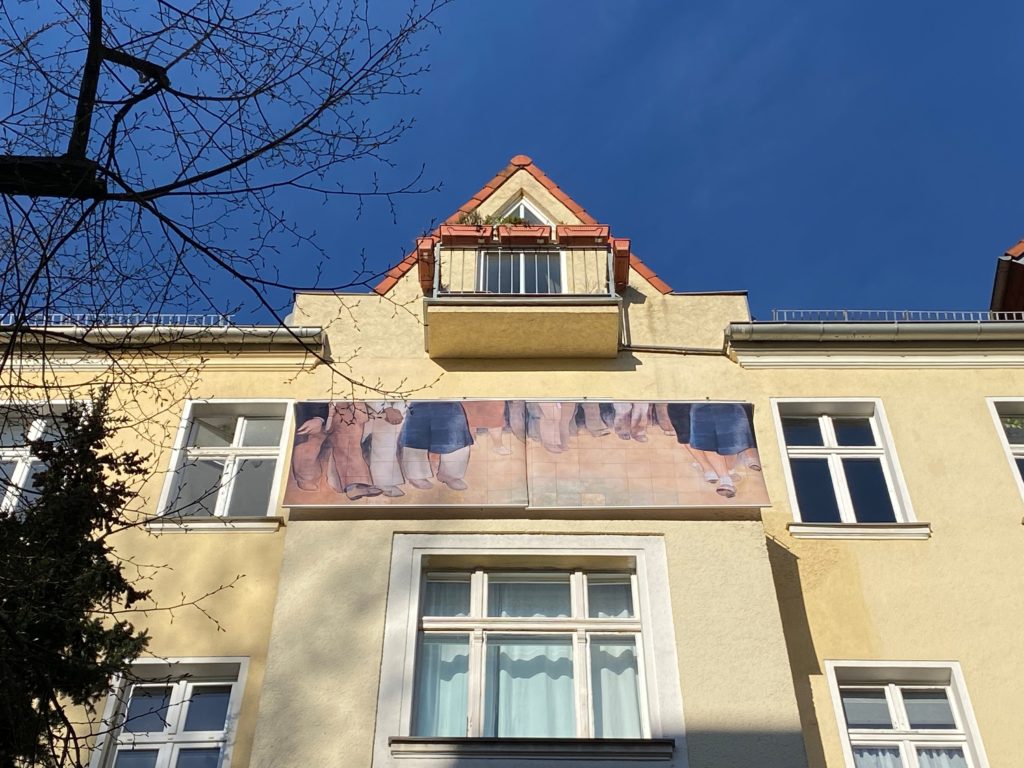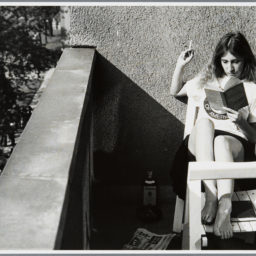While much of the art world uploads its content online, a curatorial initiative in locked-down Berlin has asked artists and cultural producers to put up art on their balconies instead, prompting viewers to put down their phones and go outside for a walk.
Some 50 Berlin creatives showed their works on balconies and windows on Sunday and Monday as creative messages of solidarity during the coronavirus lockdown. The spontaneous DIY project, called “Life, art, pandemic and proximity” was organized by curators Övül Durmusoglu and Joanna Warsza. The contributor list included artists as well as curators and art writers, and works ranged from performances to installations.
Among them were artist Raul Walch’s blue floating sculptures, twisting slowly in the wind off of a pre-war balcony. “Lockdown doesn’t mean to lock in our thoughts,” Walch tells Artnet News. “Art and artists will always find new ways of going public.”
The 48-hour showcase worked around the problem of the crowds that are drawn to gallery openings, which are currently banned in Germany. The balconies were “on view” across the cobbled streets of the Prenzlauer Berg neighborhood in the north-east of the German capital. Viewers were invited to download and follow a map with no set start or end point (to limit crowds), and A4 printouts marked with the letter “B” served as physical guides to tell people where to stop and look up, like an artistic Easter egg hunt.
Public art has gained new currency as galleries and museums in Germany and most of the world remain closed. Balconies have also become a place for connectivity in the real world, and many have been inspired by the Italian musicians who took to their balconies for an impromptu concert as the virus’s devastating effects were peaking and overwhelming their country’s healthcare system. Elsewhere, locked down citizens have been popping their heads out of their windows or stepping onto their terraces to applaud health workers.
Seven European museums, including the Reina Sofía museum in Madrid, are also in the midst of commissioning artists to create balcony-based art, with dates and participants still to be announced.

Footworks by Ulf Aminde based on a work of Max Lingner. Photo courtesy Die Balkone.
Others taking part in the Berlin initiative include the artist Olaf Nicolai, who participated in the 2017 documenta in Kassel as well as the Venice Biennale. Nicolai contributed a small window-based work, sticking three oranges to his window in reference to John Baldessari and his piece Throwing Three Balls in the Air to Get a Straight Line (Best of Thirty-Six Attempts). Elsewhere, the writer Tom McCarthy and artist Eva Stenram displayed plastic crows (the two say the store-bought birds play a “similar role to antibodies: in simulating the form of a bird, they keep real birds at bay.) Not far from there, curator Sonja Lau hung a banner that said “Whether we’ll see each other again.”
“Balconies serve as the public apertures of the private. They seem to be where the house ends, and yet not,” the curators Durmusoglu and Warsza wrote in a statement that was attached to the downloadable map. “In their political history, [balconies] have both been terraces of openness and hope, as well as platforms for authoritarianism and supremacy,” the organizers added.
German chancellor Angela Merkel is set to have a press conference on Wednesday where the government will either extend the lockdown or lift restrictions. Schools and non-essential businesses have been closed and gatherings of over two people banned since mid-March.
“In times of quarantine, so many of us cultural workers living in Berlin happen to all be here; not far from each other, and yet absent as usual,” continued Durmusoglu and Warsza. “We are asked to commit to the digital space, without critically estimating the effects of for-profit information technologies.”









